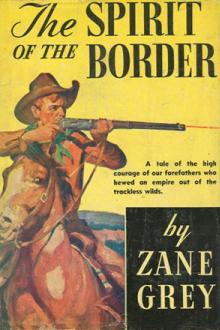Desert Gold, Zane Grey [best book series to read TXT] 📗

- Author: Zane Grey
Book online «Desert Gold, Zane Grey [best book series to read TXT] 📗». Author Zane Grey
"Senor, palo verde means 'green tree,'" added Mercedes.
This desert tree, which had struck Dick as so new and strange and beautiful, was not striking on account of size, for it was small, scarcely reaching higher than the roof; but rather because of its exquisite color of green, trunk and branch alike, and owing to the odd fact that it seemed not to possess leaves. All the tree from ground to tiny flat twigs was a soft polished green. It bore no thorns.
Right then and there began Dick's education in desert growths; and he felt that even if he had not had such charming teachers he would still have been absorbed. For the patio was full of desert wonders. A twisting-trunked tree with full foliage of small gray leaves Nell called a mesquite. Then Dick remembered the name, and now he saw where the desert got its pale-gray color. A huge, lofty, fluted column of green was a saguaro, or giant cactus. Another oddshaped cactus, resembling the legs of an inverted devil-fish, bore the name ocatillo. Each branch rose high and symmetrical, furnished with sharp blades that seemed to be at once leaves and thorns. Yet another cactus interested Gale, and it looked like a huge, low barrel covered with green-ribbed cloth and long thorns. This was the bisnaga, or barrel cactus. According to Nell and Mercedes, this plant was a happy exception to its desert neighbors, for it secreted water which had many times saved the lives of men. Last of the cacti to attract Gale, and the one to make him shiver, was a low plant, consisting of stem and many rounded protuberances of a frosty, steely white, and covered with long murderous spikes. From this plant the desert got its frosty glitter. It was as stiff, as unyielding as steel, and bore the name choya.
Dick's enthusiasm was contagious, and his earnest desire to learn was flattering to his teachers. When it came to assimilating Spanish, however, he did not appear to be so apt a pupil. He managed, after many trials, to acquire "buenos dias" and "buenos tardes," and "senorita" and "gracias," and a few other short terms. Dick was indeed eager to get a little smattering of Spanish, and perhaps he was not really quite so stupid as he pretended to be. It was delightful to be taught by a beautiful Spaniard who was so gracious and intense and magnetic of personality, and by a sweet American girl who moment by moment forgot her shyness. Gale wished to prolong the lessons.
So that was the beginning of many afternoons in which he learned desert lore and Spanish verbs, and something else that he dared not name.
Nell Burton had never shown to Gale that daring side of her character which had been so suggestively defined in Belding's terse description and Ladd's encomiums, and in her own audacious speech and merry laugh and flashing eye of that never-to-be-forgotten first meeting. She might have been an entirely different girl. But Gale remembered; and when the ice had been somewhat broken between them, he was always trying to surprise her into her real self. There were moments that fairly made him tingle with expectation. Yet he saw little more than a ghost of her vivacity, and never a gleam of that individuality which Belding had called a devil. On the few occasions that Dick had been left alone with her in the patio Nell had grown suddenly unresponsive and restrained, or she had left him on some transparent pretext. On the last occasion Mercedes returned to find Dick staring disconsolately at the rose-bordered path, where Nell had evidently vanished. The Spanish girl was wonderful in her divination.
"Senor Dick!" she cried.
Dick looked at her, soberly nodded his head, and then he laughed. Mercedes had seen through him in one swift glance. Her white hand touched his in wordless sympathy and thrilled him. This Spanish girl was all fire and passion and love. She understood him, she was his friend, she pledged him what he felt would be the most subtle and powerful influence.
Little by little he learned details of Nell's varied life. She had lived in many places. As a child she remembered moving from town to town, of going to school among schoolmates whom she never had time to know. Lawrence, Kansas, where she studied for several years, was the later exception to this changeful nature of her schooling. Then she moved to Stillwater, Oklahoma, from there to Austin, Texas, and on to Waco, where her mother met and married Belding. They lived in New Mexico awhile, in Tucson, Arizona, in Douglas, and finally had come to lonely Forlorn River.
"Mother could never live in one place any length of time," said Nell. "And since we've been in the Southwest she has never ceased trying to find some trace of her father. He was last heard of in Nogales fourteen years ago. She thinks grandfather was lost in the Sonora Desert.... And every place we go is worse. Oh, I love the desert. But I'd like to go back to Lawrence—or to see Chicago or New York—some of the places Mr. Gale speaks of.... I remember the college at Lawrence, though I was only twelve. I saw races—and once real football. Since then I've read magazines and papers about big football games, and I was always fascinated .... Mr. Gale, of course, you've seen games?
"Yes, a few," replied Dick; and he laughed a little. It was on his lips then to tell her about some of the famous games in which he had participated. But he refrained from exploiting himself. There was little, however, of the color and sound and cheer, of the violent action and rush and battle incidental to a big college football game that he did not succeed in making Mercedes and Nell feel just as if they had been there. They hung breathless and wide-eyed upon his words.
Some one else was present at the latter part of Dick's narrative. The moment he became aware of Mrs. Belding's presence he remembered fancying he had heard her call, and now he was certain she had done so. Mercedes and Nell, however, had been and still were oblivious to everything except Dick's recital. He saw Mrs. Belding cast a strange, intent glance upon Nell, then turn and go silently through the patio. Dick concluded his talk, but the brilliant beginning was not sustained.
Dick was haunted by the strange expression he had caught on Mrs. Belding's face, especially the look in her eyes. It had been one of repressed pain liberated in a flash of certainty. The mother had seen just as quickly as Mercedes how far he had gone on the road of love. Perhaps she had seen more—even more than he dared hope. The incident roused Gale. He could not understand Mrs. Belding, nor why that look of hers, that seeming baffled, hopeless look of a woman who saw the inevitable forces of life and could not thwart them, should cause him perplexity and distress. He wanted to go to her and tell her how he felt about Nell, but fear of absolute destruction of his hopes held him back. He would wait. Nevertheless, an instinct that was perhaps akin to self-preservation prompted him to want to let Nell know the state of his mind. Words crowded his brain seeking utterance. Who and what he was, how he loved her, the work he expected to take up soon, his longings, hopes, and plans—there was all this and more. But something checked him. And the repression made him so thoughtful and quiet, even melancholy, that he went outdoors to try to throw off the mood. The sun was yet high, and a dazzling white light enveloped valleys and peaks. He felt that the wonderful sunshine was the dominant feature of that arid region. It was like white gold. It had burned its color in a face he knew. It was going to warm his blood and brown his skin. A hot, languid breeze, so dry that he felt his lips shrink with its contact, came from the desert; and it seemed to smell of wide-open, untainted places where sand blew and strange, pungent plants gave a bitter-sweet tang to the air.
When he returned to the house, some hours later, his room had been put in order. In the middle of the white coverlet on his table lay a fresh red rose. Nell had dropped it there. Dick picked it up, feeling a throb in his breast. It was a bud just beginning to open, to show between its petals a dark-red, unfolding heart. How fragrant it was, how exquisitely delicate, how beautiful its inner hue of red, deep and dark, the crimson of life blood!
Had Nell left it there by accident or by intent? Was it merely kindness or a girl's subtlety? Was it a message couched elusively, a symbol, a hope in a half-blown desert rose?
VI THE YAQUI
TOWARD evening of a lowering December day, some fifty miles west of Forlorn River, a horseman rode along an old, dimly defined trail. From time to time he halted to study the lay of the land ahead. It was bare, somber, ridgy desert, covered with dun-colored greasewood and stunted prickly pear. Distant mountains hemmed in the valley, raising black spurs above the round lomas and the square-walled mesas.
This lonely horseman bestrode a steed of magnificent build, perfectly white except for a dark bar of color running down the noble head from ears to nose. Sweatcaked dust stained the long flanks. The horse had been running. His mane and tail were laced and knotted to keep their length out of reach of grasping cactus and brush. Clumsy home-made leather shields covered the front of his forelegs and ran up well to his wide breast. What otherwise would have been muscular symmetry of limb was marred by many a scar and many a lump. He was lean, gaunt, worn, a huge machine of muscle and bone, beautiful only in head and mane, a weight-carrier, a horse strong and fierce like the desert that had bred him.
The rider fitted the horse as he fitted the saddle. He was a young man of exceedingly powerful physique, wide-shouldered, long-armed, big-legged. His lean face, where it was not red, blistered and peeling, was the hue of bronze. He had a dark eye, a falcon gaze, roving and keen. His jaw was prominent and set, mastiff-like; his lips were stern. It was youth with its softness not yet quite burned and hardened away that kept the whole cast of his face from being ruthless.
This young man was Dick Gale, but not the listless traveler, nor the lounging wanderer who, two months before, had by chance dropped into Casita. Friendship, chivalry, love—the deep-seated, unplumbed emotions that had been stirred into being with all their incalculable power for spiritual change, had rendered different the meaning of life. In the moment almost of their realization the desert had claimed Gale, and had drawn him into its crucible. The desert had multiplied weeks into years. Heat, thirst, hunger, loneliness, toil, fear, ferocity, pain—he knew them all. He had felt them all—the white sun, with its glazed, coalescing, lurid fire; the caked split lips and rasping, dry-puffed tongue; the sickening ache in the pit of his stomach; the insupportable silence, the empty space, the utter desolation, the contempt of life; the weary ride, the long climb, the plod in sand, the search, search, search for water; the sleepless night alone, the watch and wait, the dread of ambush, the swift flight; the fierce pursuit of men wild as Bedouins and as fleet, the willingness to deal sudden death, the pain of poison thorn, the stinging tear of lead through flesh; and that strange paradox of the burning desert, the cold at night, the piercing icy wind, the dew that penetrated to the marrow, the numbing desert cold of the dawn.
Beyond any dream of adventure he had ever had, beyond any wild story he had ever read, had been his experience with those hard-riding rangers, Ladd and Lash. Then he had traveled alone the hundred miles of desert between Forlorn River and the Sonoyta Oasis. Ladd's prophecy of trouble on the border had been mild compared to what had become the actuality. With rebel occupancy of the garrison at Casita, outlaws, bandits, raiders in rioting bands had spread westward. Like troops of Arabs, magnificently mounted, they were here, there, everywhere along the line; and if murder





Comments (0)